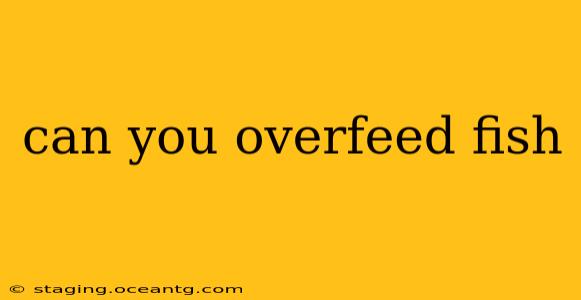Can You Overfeed Fish? Yes, and Here's Why It's a Serious Problem
The short answer is a resounding yes. Overfeeding fish is a common mistake among aquarium enthusiasts, and it can have devastating consequences for your aquatic pets. While it might seem like you're showing your fish love by giving them plenty of food, excessive feeding can lead to a variety of health problems and even death. Let's delve into the specifics.
What Happens When You Overfeed Fish?
Overfeeding leads to a buildup of uneaten food in the aquarium. This decaying matter pollutes the water, increasing ammonia, nitrite, and nitrate levels – all highly toxic to fish. This process dramatically reduces water quality, creating an unhealthy environment that can stress your fish and make them vulnerable to disease.
The effects of overfeeding can manifest in several ways:
- Water quality deterioration: As mentioned, uneaten food decomposes, releasing harmful chemicals. This can lead to cloudy water, unpleasant odors, and ultimately, a toxic environment for your fish.
- Bloated bellies and constipation: Fish, like any animal, can eat too much. Overeating can lead to bloating, discomfort, and even constipation, potentially causing internal organ damage.
- Increased risk of disease: Poor water quality, resulting from overfeeding, weakens the fish's immune system, making them more susceptible to bacterial and parasitic infections.
- Algae blooms: Excess nutrients in the water from uneaten food fuel algae growth, leading to unsightly algae blooms that can further compromise water quality.
- Fish death: In severe cases, overfeeding can directly lead to the death of your fish through toxicity and disease.
How Much Should I Feed My Fish?
The amount of food you should give your fish depends on several factors:
- Species: Different fish species have different dietary needs and appetites. Some are voracious eaters, while others are more delicate. Research the specific requirements of your fish species.
- Size: Larger fish naturally require more food than smaller ones.
- Activity level: Active fish generally need more food than less active species.
- Type of food: Some foods are more calorie-dense than others.
A general guideline is to feed only what your fish can consume in 2-3 minutes. Observe your fish while feeding; if food remains after this time, you're overfeeding. It's better to slightly underfeed than overfeed. You can adjust the feeding amount based on your observation.
What are the signs of overfeeding?
Recognizing the signs of overfeeding is crucial. Look out for:
- Leftover food: The most obvious sign is uneaten food at the bottom of the tank.
- Cloudy water: A sign of deteriorating water quality due to decaying matter.
- Bloated fish: A fish with a noticeably swollen belly may be overfed.
- Lethargy and loss of appetite: These can be signs of underlying health issues caused by overfeeding.
How to correct overfeeding?
If you suspect you've been overfeeding your fish, take immediate action:
- Reduce feeding amounts: Significantly decrease the amount of food you're giving your fish.
- Perform partial water changes: Regularly change a portion of the aquarium water to remove excess waste and improve water quality. This helps dilute the harmful chemicals released by decaying food.
- Use a gravel vacuum: Use a gravel vacuum to remove uneaten food and debris from the substrate.
- Observe your fish closely: Monitor your fish for any signs of illness or distress. If you notice any problems, consult an aquatic veterinarian or experienced fish keeper.
By understanding the risks of overfeeding and following these guidelines, you can ensure the health and well-being of your aquatic companions and maintain a thriving aquarium environment. Remember, responsible feeding is a cornerstone of successful fish keeping.
